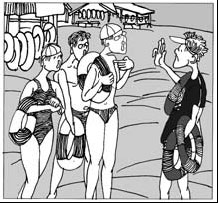One of the good things about hosting the Olympic Games is the development of tourism. Tourist resorts throughout the country are doing their utmost to benefit from the opportunity. They should, however, refrain from killing the goose that lays the golden egg with their exploitation of tourists.
Last weekend I took my daughter and grandson to Golden Beach, a tourist attraction by the Bohai Sea, to seek respite from Beijing's sweltering weather.
After checking in at a hotel, we set out for the beach. When we got there, the boy and her mother were attracted by the colorful plastic life buoys and inflatable animals displayed at a row of stalls in front of the shore. I bought a life buoy and an inflatable toy duck. Each cost 20 yuan ($2.60). But soon after we left the stall, we were dumbfounded by what met our eyes: a sign board erected on the beach which read: "For the sake of your own safety, plastic life buoys are prohibited in the water."
The first question that came to mind was: "Why is this sign placed right behind that row of stalls?"
I looked round to find two booths where some locals were renting rubber tires to tourists. Two security men wearing ID badges yelled warnings to those who tried to use plastic life rings. I had to fork out another 50 yuan to rent two tires and left the plastic life buoys on the beach.
The following is an exchange I had with one of the security men:
"Why do you allow plastic buoys to be sold here since they are prohibited?"
"No, we do not allow them to sell plastic buoys here; the stalls are over there."
"Then, why not place the warning sign in front of the stalls?"
"That's not our business. Ours is to ensure safety in the water. Hey, that guy with a plastic ring, get onshore; it's not allowed in the water!" During the conversation, more people carrying plastic buoys turned up.
"The stall owners are doing their business legally, aren't they?" the security man said.
"You let the tourists buy the plastic buoys; then you forbid them from using it; they have to rent the rubber tires here. Isn't this cheating?" I said angrily.
"If you think so, you can file a complaint (to the authorities) or call the police," the security man said sarcastically.
I was speechless.
Most of the tourists are there just for the weekend. None of them have the time to spend half a day visiting the local authorities for an explanation. Losing 50 or 60 yuan is much less than the loss of one-third of a tourist's time at the resort.
The locals obviously are fully aware of this. The security men, the rubber tire vendors and the stall owners were not breaking the law.
But it is obviously a trap. I wonder why the local government has not taken action. They can, at least, move the warning sign from the beach to the front of the stalls.
Probably the government sees it as added tourism revenue. But this should not be at the expense of tourists. There are frequent complaints reported in the press about cheating in restaurants and at the aquatic product markets of Golden Beach and neighboring Beidaihe, a more famous summer resort for Beijingers.
These two places belong to Qinhuangdao, a city that will host the soccer matches of the 2008 Olympic Games.
I want to say to the city: "For the sake of your own reputation, see that cheating is prohibited."
(By Liu Shinan Email: liushinan@chinadaily.com.cn )
(China Daily August 1, 2007)


